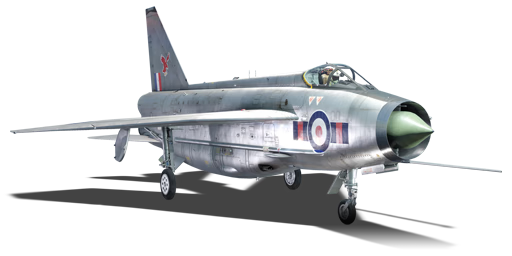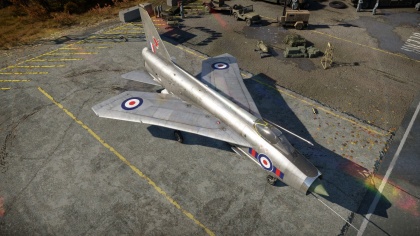Difference between revisions of "Lightning F.6"
(Added spaded stats) |
(Expanded armour / survivability) |
||
| Line 68: | Line 68: | ||
<!--''Examine the survivability of the aircraft. Note how vulnerable the structure is and how secure the pilot is, whether the fuel tanks are armoured, etc. Describe the armour, if there is any, and also mention the vulnerability of other critical aircraft systems.''--> | <!--''Examine the survivability of the aircraft. Note how vulnerable the structure is and how secure the pilot is, whether the fuel tanks are armoured, etc. Describe the armour, if there is any, and also mention the vulnerability of other critical aircraft systems.''--> | ||
In line with its role as a high performance interceptor aircraft the Lightning F.6 has no armoured plating or bulletproof glass, such additions would have increased the weight of the aircraft, while offering no real benefit for it's intended role. | In line with its role as a high performance interceptor aircraft the Lightning F.6 has no armoured plating or bulletproof glass, such additions would have increased the weight of the aircraft, while offering no real benefit for it's intended role. | ||
| + | |||
| + | Most of the inside of the wings (including the flaps) consists of fuel tanks, fuel is also stored in the ventral tank. The top engine is mounted above and to the rear of the bottom engine, this leaves it exposed to enemy fire; on the flip side the bottom engine is shielded from enemy fire by the top engine and wing fuel tanks, this makes is surprisingly resilient to damage, it is not uncommon for it to even continue functioning after the aircraft has been hit my a missile (although the rest of the aircraft will be well and truly broken afterwards). | ||
| + | |||
| + | The large belly tank and high wings of the Lightning means it is able to survive belly landings very well. | ||
== Armaments == | == Armaments == | ||
Revision as of 22:56, 18 March 2020
Contents
Description
The Lightning F.6 is a rank British jet fighter
with a battle rating of (AB), (RB), and (SB). It was introduced in Update 1.97 "Viking Fury".
General info
Flight performance
Describe how the aircraft behaves in the air. Speed, manoeuvrability, acceleration and allowable loads - these are the most important characteristics of the vehicle.
| Characteristics | Max Speed (km/h at 12,192 m) |
Max altitude (metres) |
Turn time (seconds) |
Rate of climb (metres/second) |
Take-off run (metres) | |||
|---|---|---|---|---|---|---|---|---|
| AB | RB | AB | RB | AB | RB | |||
| Stock | 2,215 | 2,200 | 27.9 | 28.2 | 150.7 | 141.4 | 850 | |
| Upgraded | 2,387 | 2,290 | 24.4 | 26.0 | 195.3 | 172.0 | ||
Details
| Features | |||||
|---|---|---|---|---|---|
| Combat flaps | Take-off flaps | Landing flaps | Air brakes | Arrestor gear | Drogue chute |
| X | ✓ | ✓ | ✓ | ✓ | ✓ |
| Limits | ||||||
|---|---|---|---|---|---|---|
| Wings (km/h) | Gear (km/h) | Flaps (km/h) | Max Static G | |||
| Combat | Take-off | Landing | + | - | ||
| N/A | 720 | 463 | ~10 | ~6 | ||
| Optimal velocities (km/h) | |||
|---|---|---|---|
| Ailerons | Rudder | Elevators | Radiator |
| < 850 | < 700 | < 700 | N/A |
Survivability and armour
In line with its role as a high performance interceptor aircraft the Lightning F.6 has no armoured plating or bulletproof glass, such additions would have increased the weight of the aircraft, while offering no real benefit for it's intended role.
Most of the inside of the wings (including the flaps) consists of fuel tanks, fuel is also stored in the ventral tank. The top engine is mounted above and to the rear of the bottom engine, this leaves it exposed to enemy fire; on the flip side the bottom engine is shielded from enemy fire by the top engine and wing fuel tanks, this makes is surprisingly resilient to damage, it is not uncommon for it to even continue functioning after the aircraft has been hit my a missile (although the rest of the aircraft will be well and truly broken afterwards).
The large belly tank and high wings of the Lightning means it is able to survive belly landings very well.
Armaments
Offensive armament
Describe the offensive armament of the aircraft, if any. Describe how effective the cannons and machine guns are in a battle, and also what belts or drums are better to use. If there is no offensive weaponry, delete this subsection.
Suspended armament
Describe the aircraft's suspended armament: additional cannons under the wings, bombs, rockets and torpedoes. This section is especially important for bombers and attackers. If there is no suspended weaponry remove this subsection.
Defensive armament
Defensive armament with turret machine guns or cannons, crewed by gunners. Examine the number of gunners and what belts or drums are better to use. If defensive weaponry is not available, remove this subsection.
Usage in battles
Describe the tactics of playing in the aircraft, the features of using aircraft in a team and advice on tactics. Refrain from creating a "guide" - do not impose a single point of view, but instead, give the reader food for thought. Examine the most dangerous enemies and give recommendations on fighting them. If necessary, note the specifics of the game in different modes (AB, RB, SB).
Pros and cons
Summarise and briefly evaluate the vehicle in terms of its characteristics and combat effectiveness. Mark its pros and cons in the bulleted list. Try not to use more than 6 points for each of the characteristics. Avoid using categorical definitions such as "bad", "good" and the like - use substitutions with softer forms such as "inadequate" and "effective".
Pros:
Cons:
History
Describe the history of the creation and combat usage of the aircraft in more detail than in the introduction. If the historical reference turns out to be too long, take it to a separate article, taking a link to the article about the vehicle and adding a block "/History" (example: https://wiki.warthunder.com/(Vehicle-name)/History) and add a link to it here using the main template. Be sure to reference text and sources by using <ref></ref>, as well as adding them at the end of the article with <references />. This section may also include the vehicle's dev blog entry (if applicable) and the in-game encyclopedia description (under === In-game description ===, also if applicable).
Media
See also
Links to the articles on the War Thunder Wiki that you think will be useful for the reader, for example:
- reference to the series of the aircraft;
- links to approximate analogues of other nations and research trees.
External links
Paste links to sources and external resources, such as:
- topic on the official game forum;
- encyclopedia page on the aircraft;
- other literature.
| The English Electric Company Limited | |
|---|---|
| Jet Fighters | Lightning F.6 · Lightning F.53 |
| Jet Bombers | Canberra B Mk 2 · Canberra B (I) Mk 6 |
| Tanks | Excelsior |
| The English Electric Company allowed the Glenn L. Martin Company to license-build Canberra bombers for the United States Air Force. | |
| Britain jet aircraft | |
|---|---|
| Blackburn | Buccaneer S.1 · Buccaneer S.2 · Buccaneer S.2B |
| British Aerospace | Harrier GR.7 · Sea Harrier FRS.1 (e) · Sea Harrier FRS.1 · Sea Harrier FA 2 |
| British Aircraft Corporation | Strikemaster Mk.88 |
| English Electric | Canberra B Mk 2 · Canberra B (I) Mk 6 · Lightning F.6 · Lightning F.53 |
| Gloster | Meteor F Mk 3 · Sea Meteor F Mk 3 · Meteor F Mk 4 G.41F · Meteor F Mk 4 G.41G · Meteor F Mk 8 G.41K · Meteor F Mk.8 Reaper |
| Javelin F.(A.W.) Mk.9 | |
| de Havilland | Vampire F.B.5 · Venom FB.4 · Sea Venom FAW 20 · Sea Vixen F.A.W. Mk.2 |
| Hawker | Sea Hawk FGA.6 · Hunter F.1 · Hunter F.6 · Hunter FGA.9 · Harrier GR.1 · Harrier GR.3 |
| Panavia | Tornado GR.1 · Tornado GR.4 · Tornado F.3 · Tornado F.3 Late |
| SEPECAT | Jaguar GR.1 · Jaguar GR.1A · Jaguar IS |
| Supermarine | Attacker FB 1 · Attacker FB.2 · Scimitar F Mk.1 · Swift F.1 · Swift F.7 |
| Foreign | Phantom FG.1 (USA) · Phantom FGR.2 (USA) · F-4J(UK) Phantom II (USA) |
| Australia | F-111C |
| India | ▄MiG-21 Bison |
| South Africa | ▄JAS39C |





